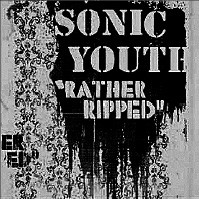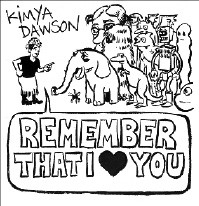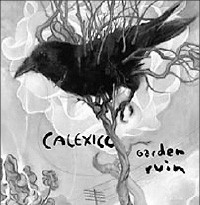
Rather Ripped
Sonic Youth
(DGC)
Aging art stars jam and groove with their most tuneful album in ages.
Sonic Youth is the world’s greatest jam band. Or is that the world’s greatest jazz band? Can’t possibly be the world’s greatest groove band, right? As an avowed song fan, I’m strictly a dabbler when it comes to these categories, but I play Sonic Youth the same way I play Orchestra Baobob and Guitar Paradise of East Africa or James Carter and Sonny Rollins: as background music I can’t let stay in the background.
There’s an odd bell-curve-like trajectory to the band’s going-on-25-years-now career — from free-formish noise to mainstreamish alt-rock to noise again. But since I find their more recent meanderings so much more compelling than their kill-yr-idols era provocations, I’m tempted to say that selling out was the best thing that ever happened to this band. Or was it just aging? Or maybe parenthood?
Regardless, the new Rather Ripped is the band’s best since 1998’s epic A Thousand Leaves launched a ruminative period and maybe their most outright tuneful album since 1992’s Dirty went commercial. Or maybe their most tuneful record, period.
Returning to a foursome after a three-album courtship with avant-noise fifth wheel Jim O’Rourke, Rather Ripped signifies a change from the very outset, when guitarists Lee Ranaldo and Thurston Moore lock in a blast of clean, crisp, layered riffage on the opening “Reena.” This isn’t the kind of head-spinning, nearly psychedelic guitar “radiance” they made their legend with at their Daydream Nation peak. It’s more gentle — prettier. But at the same time, it retains the texture of the band’s earlier work. It’s weirder and more complicated than it sounds on the surface. This is probably why late-period Sonic Youth albums such as A Thousand Leaves and Sonic Nurse and now this one retain their freshness through repeated listens.
Of course, Sonic Youth is a song band — sort of. The words here come at you in verse-chorus or verse-refrain structures that seem like pop songs, but the words defy meaning. They’re suggestions made whole by sound. “Do you belie-ieve in rapture, babe?” Moore sings with a shaky amateur sweetness, and the guitars answer back in the affirmative. — Chris Herrington
Grade: A-

Remember That I Love You
Kimya Dawson
(K)
I think I might hate the (overheated) new Bruce Springsteen album and can’t abide any of the hipster folkie stuff currently using up its 15 minutes in the trend cycle. When it comes to folk music, I tend to value humor, warmth, modesty, and lack of affectation, which means underdogs like Todd Snider and especially Kimya Dawson. This latest batch of mostly acoustic, unabashedly personal, sing-songy ditties isn’t much different, much better, or much worse than all the other under-the-radar albums Dawson has circulated since the break-up of her inspired duo Moldy Peaches (search out 2004’s Hidden Vagenda). If Dawson’s music sounds childlike, it’s not because she romanticizes her own childhood but because she’s used to entertaining kids (her parents owned a day care) and wants to communicate as directly as possible. She loves Scrabble, her mom, staying up late playing video games, her friends, and — if you’re willing to listen for a while — you too. (“My Mom,” “Loose Lips,” “I Like Giants,” “12/26”) — CH
Grade: B+

Garden Ruin
Calexico
(Quarterstick)
Calexico remain musically multilingual on their latest album, filling a dozen songs with a predictably wide range of styles: mariachi, meringue, country, folk, and jazz. But the emphasis on Garden Ruin appears to be American rock. The band’s expansive sound, which reached a career peak on 2002’s excellent Feast of Wire, here serves Joey Burns’ songwriting, an arrangement of priorities that proves mostly rewarding and a little bit frustrating. On “Cruel,” “Bisbee Blue,” and “Letter to Bowie Knife,” he crafts elegantly concise lyrical lines and melodies that propel the music forward. As Garden Ruin progresses, the structures deviate from the traditional and the typical, incorporating dramatic vocals in both French and Spanish. Occasionally, the songs keen toward the fatally understated (“Smash”) or the jarringly overwrought (closer “All Systems Red”), but on the whole, the album is well tended, even if it does creep toward ruin. (“Cruel,” “Letter to Bowie Knife,” “Roka”) — Stephen Deusner
Grade: B